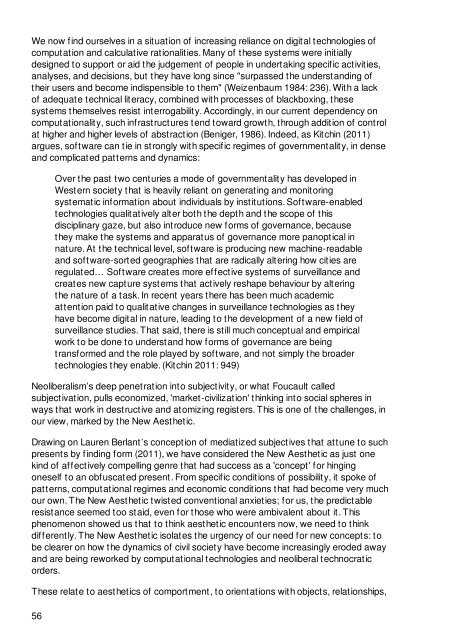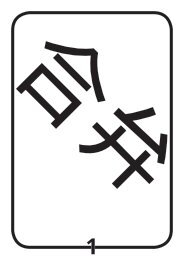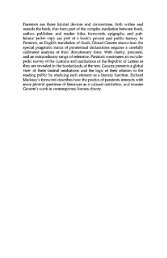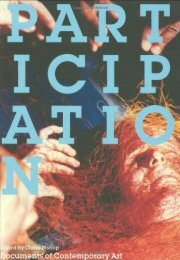New Aesthetic New Anxieties - Institute for the Unstable Media
New Aesthetic New Anxieties - Institute for the Unstable Media
New Aesthetic New Anxieties - Institute for the Unstable Media
You also want an ePaper? Increase the reach of your titles
YUMPU automatically turns print PDFs into web optimized ePapers that Google loves.
We now find ourselves in a situation of increasing reliance on digital technologies ofcomputation and calculative rationalities. Many of <strong>the</strong>se systems were initiallydesigned to support or aid <strong>the</strong> judgement of people in undertaking specific activities,analyses, and decisions, but <strong>the</strong>y have long since "surpassed <strong>the</strong> understanding of<strong>the</strong>ir users and become indispensible to <strong>the</strong>m" (Weizenbaum 1984: 236). With a lackof adequate technical literacy, combined with processes of blackboxing, <strong>the</strong>sesystems <strong>the</strong>mselves resist interrogability. Accordingly, in our current dependency oncomputationality, such infrastructures tend toward growth, through addition of controlat higher and higher levels of abstraction (Beniger, 1986). Indeed, as Kitchin (2011)argues, software can tie in strongly with specific regimes of governmentality, in denseand complicated patterns and dynamics:Over <strong>the</strong> past two centuries a mode of governmentality has developed inWestern society that is heavily reliant on generating and monitoringsystematic in<strong>for</strong>mation about individuals by institutions. Software-enabledtechnologies qualitatively alter both <strong>the</strong> depth and <strong>the</strong> scope of thisdisciplinary gaze, but also introduce new <strong>for</strong>ms of governance, because<strong>the</strong>y make <strong>the</strong> systems and apparatus of governance more panoptical innature. At <strong>the</strong> technical level, software is producing new machine-readableand software-sorted geographies that are radically altering how cities areregulated… Software creates more effective systems of surveillance andcreates new capture systems that actively reshape behaviour by altering<strong>the</strong> nature of a task. In recent years <strong>the</strong>re has been much academicattention paid to qualitative changes in surveillance technologies as <strong>the</strong>yhave become digital in nature, leading to <strong>the</strong> development of a new field ofsurveillance studies. That said, <strong>the</strong>re is still much conceptual and empiricalwork to be done to understand how <strong>for</strong>ms of governance are beingtrans<strong>for</strong>med and <strong>the</strong> role played by software, and not simply <strong>the</strong> broadertechnologies <strong>the</strong>y enable. (Kitchin 2011: 949)Neoliberalism’s deep penetration into subjectivity, or what Foucault calledsubjectivation, pulls economized, 'market-civilization' thinking into social spheres inways that work in destructive and atomizing registers. This is one of <strong>the</strong> challenges, inour view, marked by <strong>the</strong> <strong>New</strong> <strong>Aes<strong>the</strong>tic</strong>.Drawing on Lauren Berlant’s conception of mediatized subjectives that attune to suchpresents by finding <strong>for</strong>m (2011), we have considered <strong>the</strong> <strong>New</strong> <strong>Aes<strong>the</strong>tic</strong> as just onekind of affectively compelling genre that had success as a 'concept' <strong>for</strong> hingingoneself to an obfuscated present. From specific conditions of possibility, it spoke ofpatterns, computational regimes and economic conditions that had become very muchour own. The <strong>New</strong> <strong>Aes<strong>the</strong>tic</strong> twisted conventional anxieties; <strong>for</strong> us, <strong>the</strong> predictableresistance seemed too staid, even <strong>for</strong> those who were ambivalent about it. Thisphenomenon showed us that to think aes<strong>the</strong>tic encounters now, we need to thinkdifferently. The <strong>New</strong> <strong>Aes<strong>the</strong>tic</strong> isolates <strong>the</strong> urgency of our need <strong>for</strong> new concepts: tobe clearer on how <strong>the</strong> dynamics of civil society have become increasingly eroded awayand are being reworked by computational technologies and neoliberal technocraticorders.These relate to aes<strong>the</strong>tics of comportment, to orientations with objects, relationships,56








